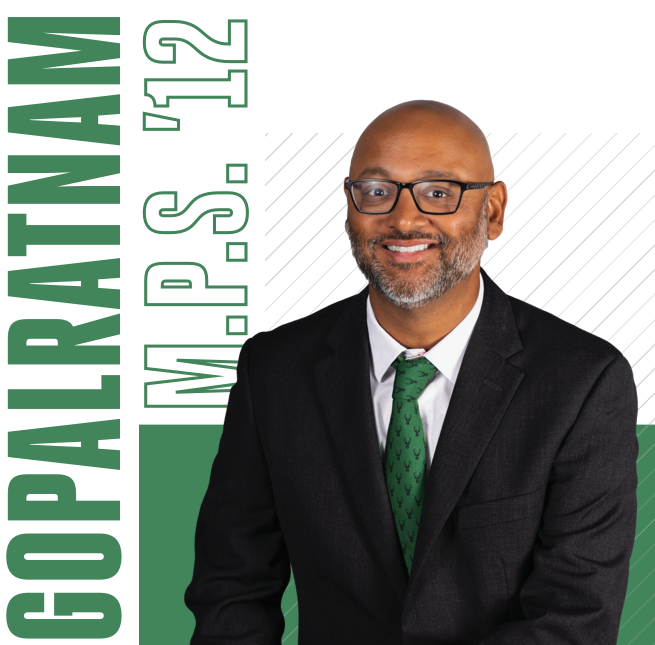Game Changer
Game Changer
A lifelong fan of the Bucks, Arvind Gopalratnam oversees the team’s social impact and philanthropy efforts.
by Tom Kertscher

The son of immigrants from India, Arvind Gopalratnam, M.P.S. ’12, was the first in his family born in the United States. He grew up in Mequon, Wis., a predominantly white Milwaukee suburb with only a handful of classmates who looked like him.
That experience helped prepare him for his current position in the National Basketball Association as vice president of corporate social responsibility for the Milwaukee Bucks and executive director of the Milwaukee Bucks Foundation. In those roles, he leads philanthropic community programs and advocacy efforts for the team he’s been a fan of since elementary school.
“Growing up with people that don’t all look like you can be a challenge, but it can also be an opportunity to mold you into a special type of communicator,” said Gopalratnam (pronounced go-paul-rut-num).
Early on, he learned to make connections with others from different backgrounds—a skill set he still draws on today. Playing sports helped him “embrace American culture while being raised by immigrant parents.”
It was a breakthrough when the high school junior varsity baseball coach made him team captain. The recognition was “a validating moment” for him. “Culture doesn't matter, background doesn't matter. It’s about who can be the best at what they're doing,” he said.
Gopalratnam is now the only Indian American corporate social responsibility leader in the 30-team NBA, a status he calls “empowering and motivating.
“I feel a personal responsibility to further connect my Indian community to the Bucks, professional basketball and careers in sports,” he said.
Earlier career work helped Gopalratnam prepare for the Bucks and fulfill a dream to work in sports.

“Growing up with people that don't all look like you can be a challenge, but it can also be an opportunity to mold you into a special type of communicator.”
Gopalratnam had been a communications executive at GE HealthCare—where he led the company’s sponsorship of the 2010 Winter Olympics in Vancouver—when the Bucks hired him in 2016.
In his new job, Gopalratnam was tasked with developing “a strong culture of community impact.
“My mission is to constantly have a good pulse of the community and to figure out different ways that my organization, my colleagues, our philanthropy can impact the people of Wisconsin,” Gopalratnam said.
“We have a platform, we have a voice. We’re going to use it, especially to be a voice for the voiceless,” he said.
The Bucks’ social responsibility efforts focus on justice reform, civic engagement, health and wellness, and youth education and mentoring. Similarly, its foundation gives grants and leads other efforts in education, health and wellness, and civic engagement.
Over the years, donations have supported youth development, mental health, justice reform and civic engagement, benefiting groups such as the Boys and Girls Clubs, Big Brothers Big Sisters, the Running Rebels youth mentoring group, the Wisconsin Equal Justice Fund and Wisconsin Conservation Voices.
Under his leadership, the Bucks have been part of programs to increase voter turnout and help formerly incarcerated people return to the community. The team has also advocated for criminal justice reform.
The team’s outreach was boosted in 2021 after the Bucks won the NBA championship for the first time in 50 years. The championship “brought more companies wanting to sponsor the team and that subsequently led to more collaborative impact work in the community,” Gopalratnam said. “Winning helped us fundraise in new and bigger ways.”
In 2023-24, the foundation made $1.6 million in grants and charitable donations, offered 50 youth basketball camps, and provided its Math Hoops program to nearly 11,000 students. In Math Hoops, students use a board game and an app to build mathematical skills while tracking statistics of players in the NBA and WNBA.
The team also hosted a two-week STEM camp for kids, welcomed 200 students in programs to learn how the Bucks’ front office works, and offered a free one-year weight loss and fitness program for low-income residents.
In recognition of the team’s efforts, the NBA gave the Bucks its Inclusion Leadership Award earlier this year, citing several of the team’s community initiatives, including work training for incarcerated individuals.
“We’re here to represent all communities, and be as inclusive as possible,” Gopalratnam said. “It’s not just words. We always use the phrase, ‘let’s walk the walk before we talk the talk.’”
Photography: Courtesy of Arvind Gopalratnam

